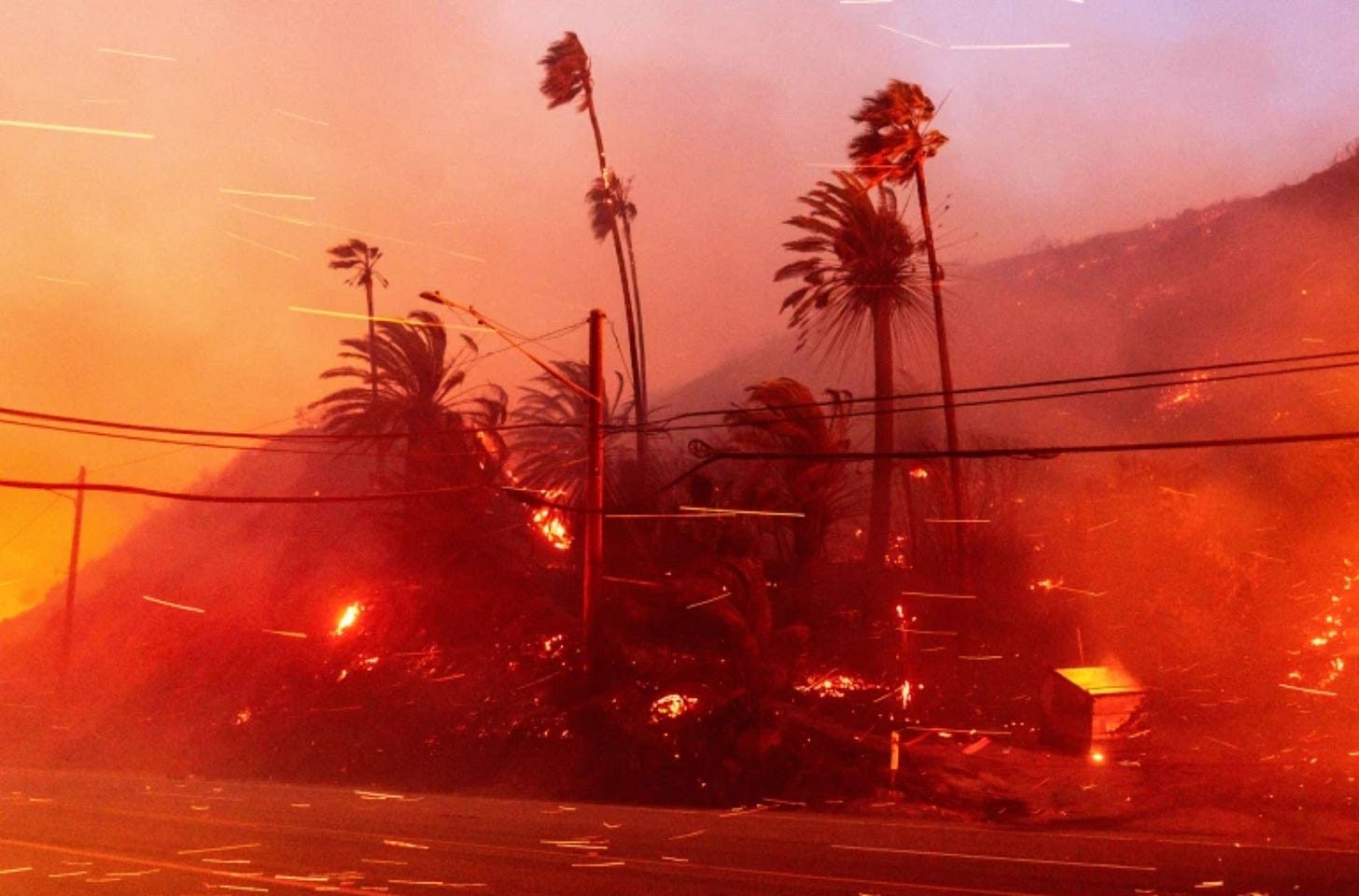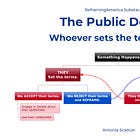Whether climate destabilization is causing extreme wildfires is not subject to debate, and talking about it is not “political.” We take control of this debate by demanding that Trump explain what his administration intends to do to prevent the further increase in dangerous and destructive weather. That is what moral leadership looks like. Here is how to reframe this debate.
Note:
I briefly lived in the Santa Monica Canyon, now a few blocks from the perimeter of the Palisades Fire which they say is currently 0% contained. Even though I haven’t lived there in decades, I keep checking the map to see if that beautiful home has been engulfed in fire. I cannot even imagine what the people who live there now are going through.
Taking the Lead
I will be talking a lot about “moral leadership” in the coming months. There is a bigger story about a sixty-year battle over the moral compass of America, and how we need to make an aggressive and overt case for the kind of basic human decency we always assumed was a “given” in our society.
On a day-to-day level, moral leadership is a critical part of the process of reframing the debate.
Right now, we follow. The public debate happens almost exclusively on Republicans’ terms, so much so that we don’t even realize it. It’s going to take real effort by our entire community to break the habit of reacting and start setting the agenda.
To take the lead, we must tie everything we talk about, every day, back to our values, to our understanding of how the world works and what is right and wrong. That is how the Right hijacked the public debate and how we will take it back.
Thank you for reading Reframing America! I need your help to continue this critical mission. The best thing you can do is to forward this email to everyone you know who cares about improving how we communicate with the American people.
Fighting Fire with Fire
What does moral leadership look like in the public dialogue about the wildfires currently happening in the Los Angeles area? What happens when we make the debate about right and wrong, about what we owe to each other as people who live together in a society and on a planet?
It does NOT look like debating whether or not these wildfires and other weather-related catastrophes are caused by global warming. The corporate conservative movement has dragged the conversation so far to the right that we are arguing over whether reality is reality.
It does NOT look like debating whether or not it is appropriate to talk about “political things” at a time of crisis. Discussing the actual causes of a crises and who is responsible is not “making it political.” It is a legitimate part of the story and no more subject to ideological disagreement than talking about what caused a train crash or an outbreak of E. coli.
Rejecting their terms.
Setting the agenda of the public debate is like negotiating the terms of a candidates’ debate. If you get to determine which questions will be asked, you win. We have to start treating what Republicans say as a “proffer of terms” for a debate, terms that we can and should reject. The way to reject unfavorable terms for public debate is to not engage, not even to refute them.
In a mathematical proof or scientific experiment, the “givens” are those things that are taken to be true, that everyone agrees on in advance, as opposed to the problem you are trying to solve or question you are trying to answer. Setting the terms of the debate often involves making assertions about which things should be assumed to be “givens” and which things are literally “debatable.”
Their terms assert that the causal relationship between global warming and extreme weather is debatable and take as given that talking about it is inherently political. We do not agree with those assertions. Engaging in these debates in any way would only validate them.
Instead, we have to launch a debate on our own terms and hope they take the bait and engage. I lay out how the process works in more detail in this previous newsletter:
Establishing Our Terms
People’s understanding of reality is formed both by what is subject to debate and what is not. One way we get people to see reality from our perspective is by asking questions that assert that the things that we know to be true are actually true.
For example, this debate should start with the “given” that global warming is causing instability in our climate which is driving increasingly destructive and dangerous weather.
We should also take as “given” that human beings have created and perpetuated this problem through dependence on fossil fuels, and that fossil fuel companies bear responsibility both for creating this problem and for trying to block solutions.
I am not saying that we don’t have to say these things out loud. We do. It’s just that we must always talk about them as widely accepted and unassailable facts. If we assert that those statements are true, what remains debatable? Not whether action should be taken, but which action should be taken and how.
We should go on the offensive and demand to hear from Trump about what he and his administration are going to do to reduce global warming and prevent further increase in dangerous and destructive weather. And while we’re at it, let’s demand to hear from the rest of our public officials on both sides of the aisle what they’re going to do about it moving forward (while also giving appropriate credit to those who have taken action and fought for more.)
That is what moral leadership looks like in the public debate. Why? Because in addition to asserting important things about what is true, this approach opens the door for us to connect what is happening in the news to larger themes about our values, right and wrong, and the role government should play in our society.
By making it about our values, we explain why it is legitimate for us to expect and demand that Trump and our political leaders take more action to reduce global warming.
How to frame this debate:
What do the hurricanes in North Carolina and the wildfires in Los Angeles have in common? They are just the latest examples of dangerous, destructive and even deadly weather caused by the destabilization of our climate due to global warming. We seem to have only brief periods of calm between increasingly unprecedented crises that are traumatizing to all who experience and observe them, especially to those who have lost their loved ones, their homes, their neighborhoods, and their history.
The fact that it keeps getting worse shows that our leaders have failed to take sufficient action to prevent this major threat to the health and safety of all Americans.
We cannot deal with global warming as individuals. We do not have the power to place limits on the actions of oil companies or negotiate with other countries. That’s what we have government for.
As people who live in this country together, we are responsible for each other and for our common future. Democratic government is how we carry out those obligations. We elect people to serve us in government and we expect them to plan wisely for our future and protect us from harm, and that includes preserving the climate we depend on to survive.
The question is not whether our government should take more action, it is why have corporate interests been allowed to engage in such reckless and dangerous behavior for so long, and who has enabled them to do so?
What is wrong with the moral compass of our society that we prioritize enabling a handful of people to extract profits far and above what one would need to live a luxurious life, to indulge their increasingly insatiable greed, over the rights of all of humanity to live in a stable and healthy climate, to not have their homes and lives destroyed by floods and fires?
Our leaders are responsible for using the power that we have delegated to them to stand up to oil companies and other private corporate interests and make the changes that need to be made, on behalf of us, the American people.
We do not want to hear any more excuses. All that remains to be discussed is how they intend to do it.
You don’t need to use those exact terms, although I recommend the words and phrases in bold. What matters is that you speak from that perspective.
There is not one single radical thing in that statement, not one thing that most people do not already believe. It only sounds awkward because we’re so out of practice at stating our values out loud that our brains struggle to make the neural connections. It will get easier for us and sound more normal and natural to our listeners and readers. All we have to do is say it and keep saying it, over and over again.
Thank you for joining me in this New Year. I know this is going to be hard.
I sincerely hope that I can help by keeping us focused on making the case for what should be. It will be easier to cope if we are able to escape the feeling of powerlessness that comes from reacting to Republican bait, and can instead find agency in providing moral leadership to a country very much in need of it.
We can do this, together.
In solidarity,
Antonia
My work is completely financed by subscribers like you. All content is free, but many people choose to be paying subscribers. Subscribe now to make sure you don’t miss any issues, or upgrade to a paying subscription to help support this work!
Contact me at antonia@antoniascatton.com or (202) 922-6647








Your post inspired this infographic. I cited your framing suggestion along with attribution back to you. There's also a free teleprompter app with an adapted version of the talking points.
GLOBAL WARMING profiteers hide during Los Angeles fire tragedy
https://thedemlabs.org/2025/01/10/global-warming-profiteers-hide-during-los-angeles-fire-tragedy/
Antonia -- this is fabulous. I am an organizer with LeanLeftVt. We are gearing up to get our volunteers engaged in messaging both social media and possibly print (postcards, letters). Would there be any possibility of you putting short posts on Bluesky and Facebook so that we can get our volunteers to repost the messages. We need to get them comfortable using these social media channels and getting the hang of reframing. Thanks!